2016 LessWrong Diaspora Survey Analysis: Part Four (Politics, Calibration & Probability, Futurology, Charity & Effective Altruism)
post by namespace (ingres) · 2016-09-10T03:51:44.051Z · LW · GW · Legacy · 25 commentsContents
Politics Political Opinions By Political Affiliation Miscellaneous Politics PoliticalInterest Voting AmericanParties If you are an American, what party are you registered with? Calibration And Probability Questions Calibration Questions Probability Questions Futurology Cryonics Cryonics Are you signed up for cryonics? CryonicsNow Do you think cryonics, as currently practiced by Alcor/Cryonics Institute will work? CryonicsPossibility Singularity SingularityYear By what year do you think the Singularity will occur? Answer such that you think, conditional on the Singularity occurring, there is an even chance of the Singularity falling before or after this year. If you think a singularity is so unlikely you don't even want to condition on it, leave this que... Genetic Engineering ModifyOffspring Would you ever consider having your child genetically modified for any reason? GeneticTreament Would you be willing to have your child genetically modified to prevent them from getting an inheritable disease? GeneticImprovement Would you be willing to have your child genetically modified for improvement purposes? (eg. To heighten their intelligence or reduce their risk of schizophrenia.) GeneticCosmetic Would you be willing to have your child genetically modified for cosmetic reasons? (eg. To make them taller or have a certain eye color.) GeneticOpinionD What's your overall opinion of other people genetically modifying their children for disease prevention purposes? GeneticOpinionI What's your overall opinion of other people genetically modifying their children for improvement purposes? GeneticOpinionC What's your overall opinion of other people genetically modifying their children for cosmetic reasons? Technological Unemployment LudditeFallacy Do you think the Luddite's Fallacy is an actual fallacy? UnemploymentYear By what year do you think the majority of people in your country will have trouble finding employment for automation related reasons? If you think this is something that will never happen leave this question blank. EndOfWork Do you think the "end of work" would be a good thing? EndOfWorkConcerns If machines end all or almost all employment, what are your biggest worries? Pick two. Existential Risk XRiskType Which disaster do you think is most likely to wipe out greater than 90% of humanity before the year 2100? Charity And Effective Altruism Charitable Giving Income What is your approximate annual income in US dollars (non-Americans: convert at www.xe.com)? Obviously you don't need to answer this question if you don't want to. Please don't include commas or dollar signs. IncomeCharityPortion How much money, in number of dollars, have you donated to charity over the past year? (non-Americans: convert to dollars at http://www.xe.com/ ). Please don't include commas or dollar signs in your answer. For example, 4000 XriskCharity How much money have you donated to charities aiming to reduce existential risk (other than MIRI/CFAR) in the past year? CharityDonations How much have you donated in US dollars to the following charities in the past year? (Non-americans: convert to dollars at http://www.xe.com/) Please don't include commas or dollar signs in your answer. Options starting with "any" aren't the name of a charity but a category of charity. Effective Altruism Vegetarian Do you follow any dietary restrictions related to animal products? EAKnowledge Do you know what Effective Altruism is? EAIdentity Do you self-identify as an Effective Altruist? EACommunity Do you participate in the Effective Altruism community? EADonations Has Effective Altruism caused you to make donations you otherwise wouldn't? Effective Altruist Anxiety EAAnxiety Have you ever had any kind of moral anxiety over Effective Altruism? EAOpinion What's your overall opinion of Effective Altruism? Interesting Tables None 25 comments
Politics
The LessWrong survey has a very involved section dedicated to politics. In previous analysis the benefits of this weren't fully realized. In the 2016 analysis we can look at not just the political affiliation of a respondent, but what beliefs are associated with a certain affiliation. The charts below summarize most of the results.
Political Opinions By Political Affiliation
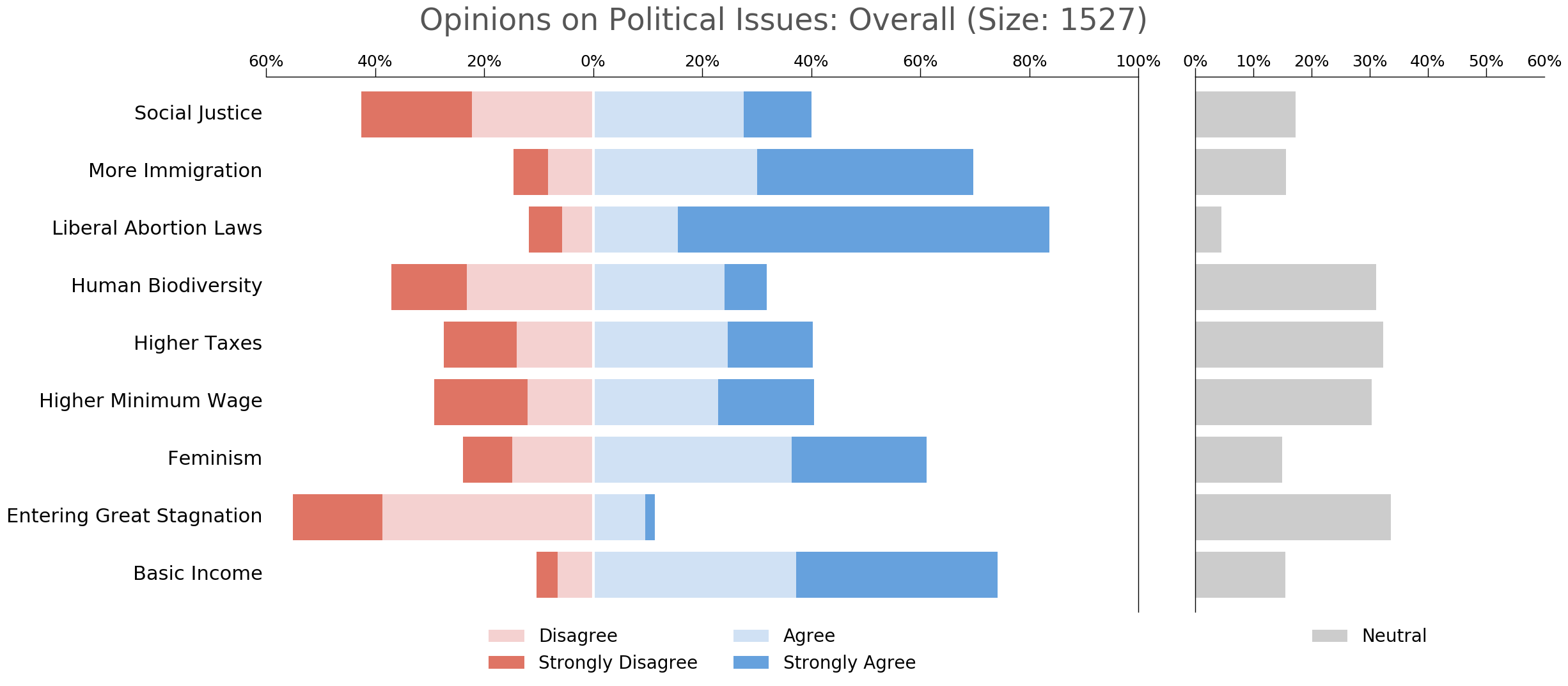
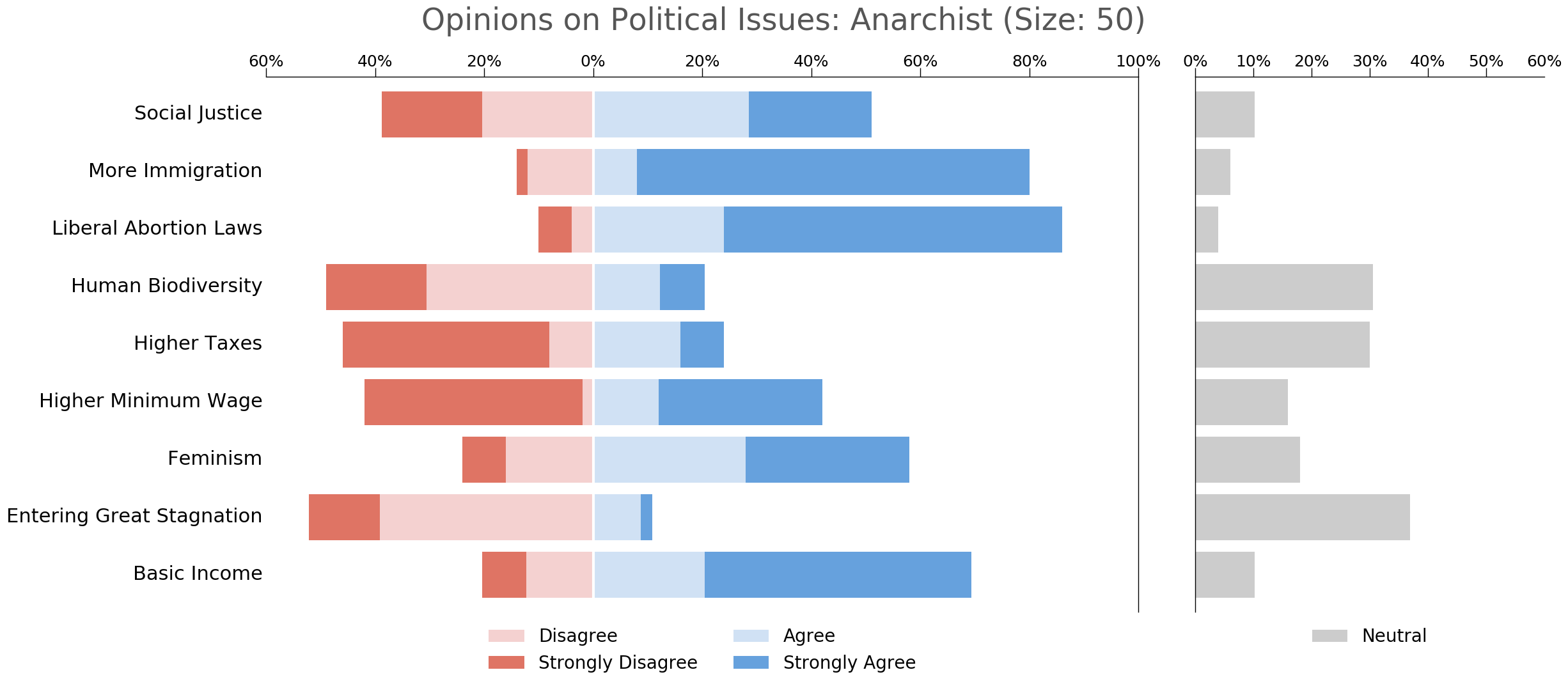
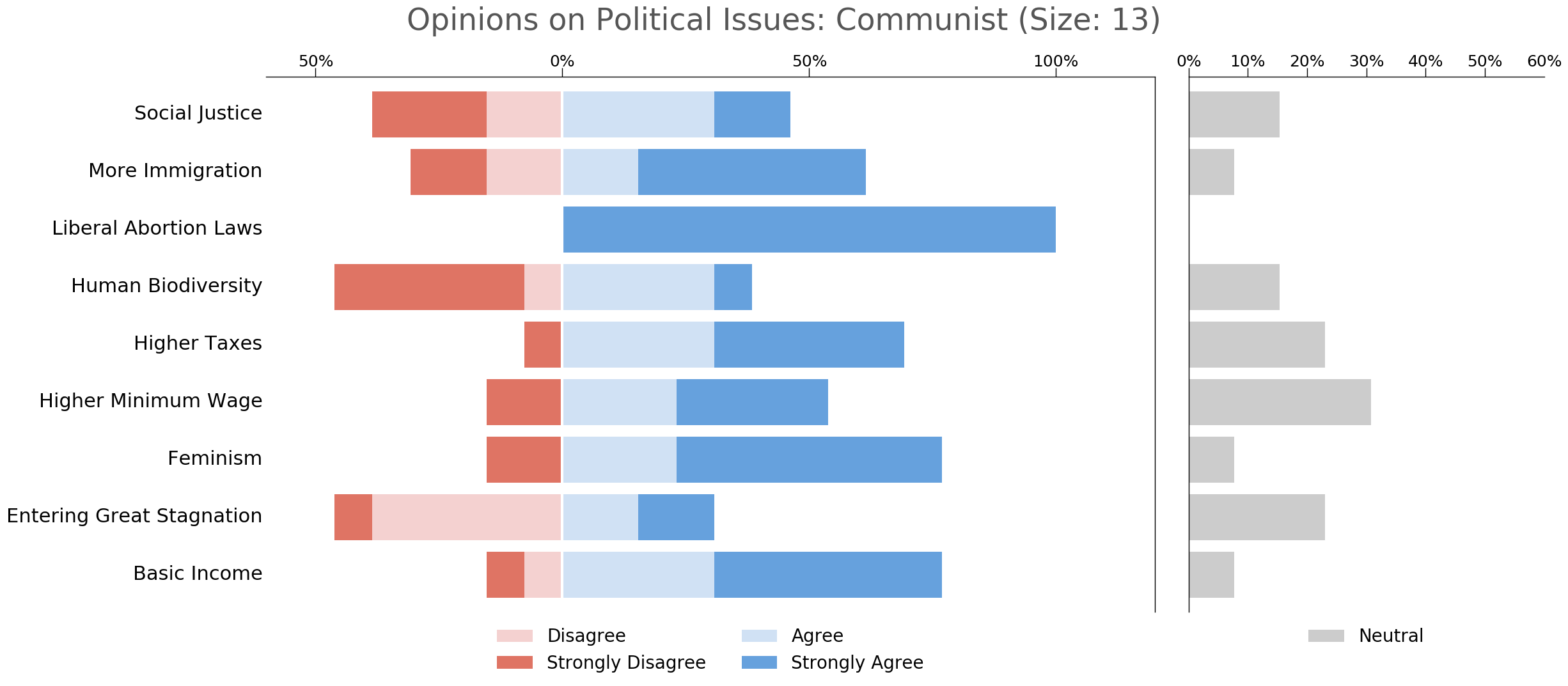

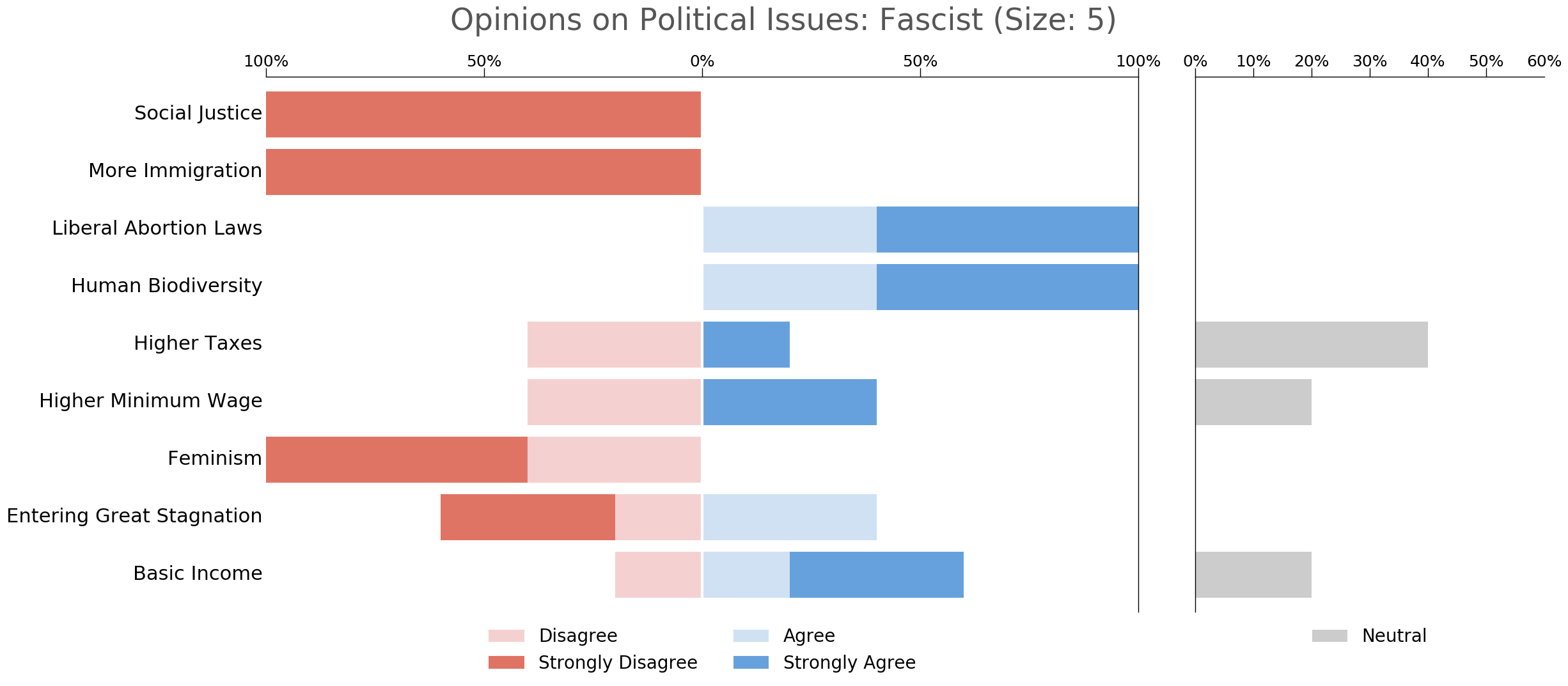
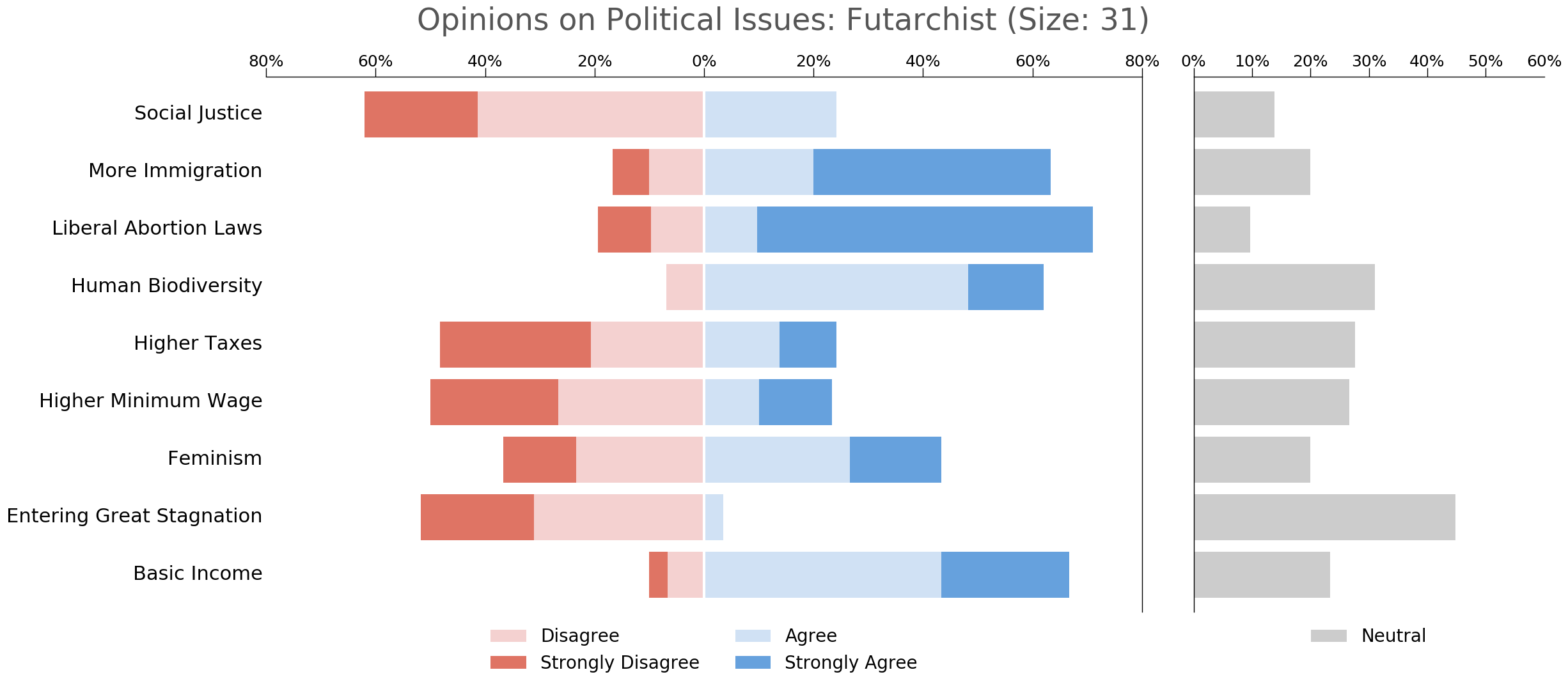
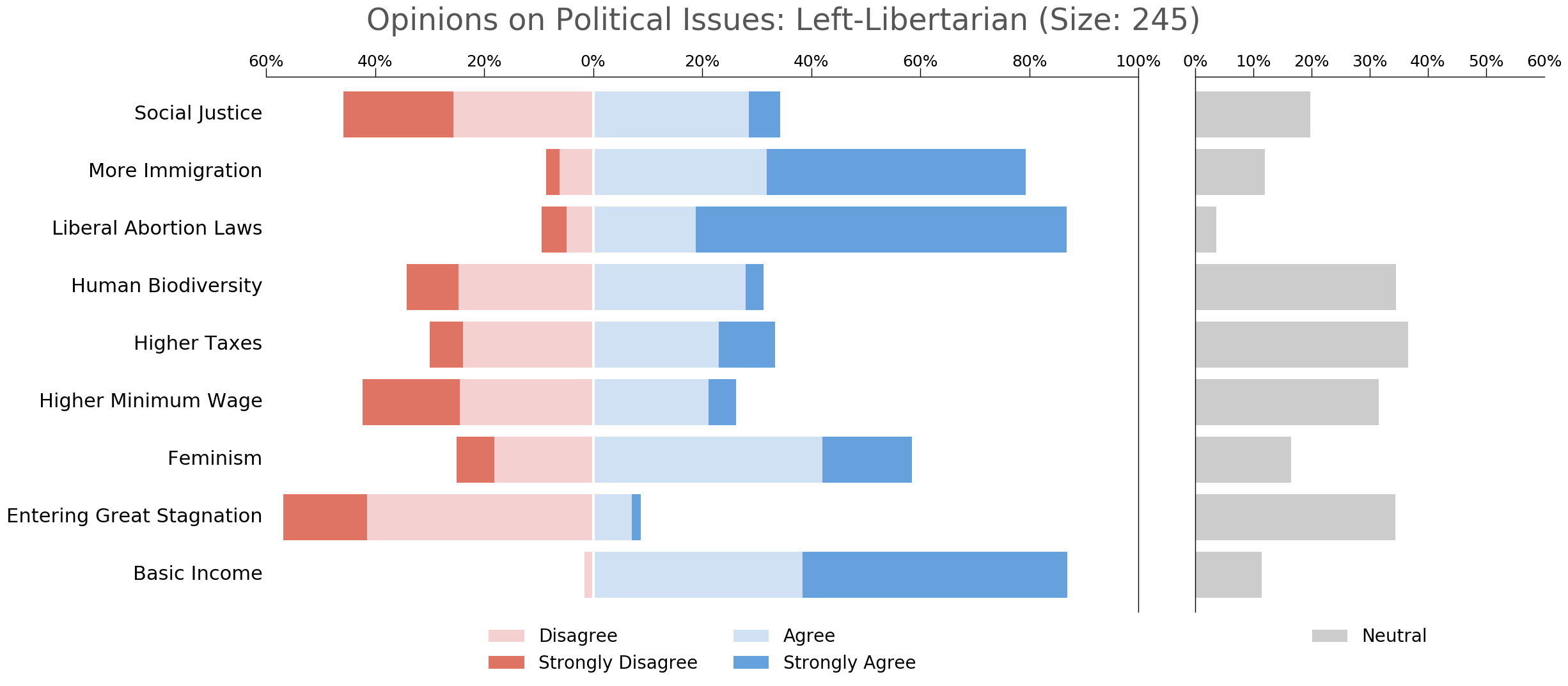
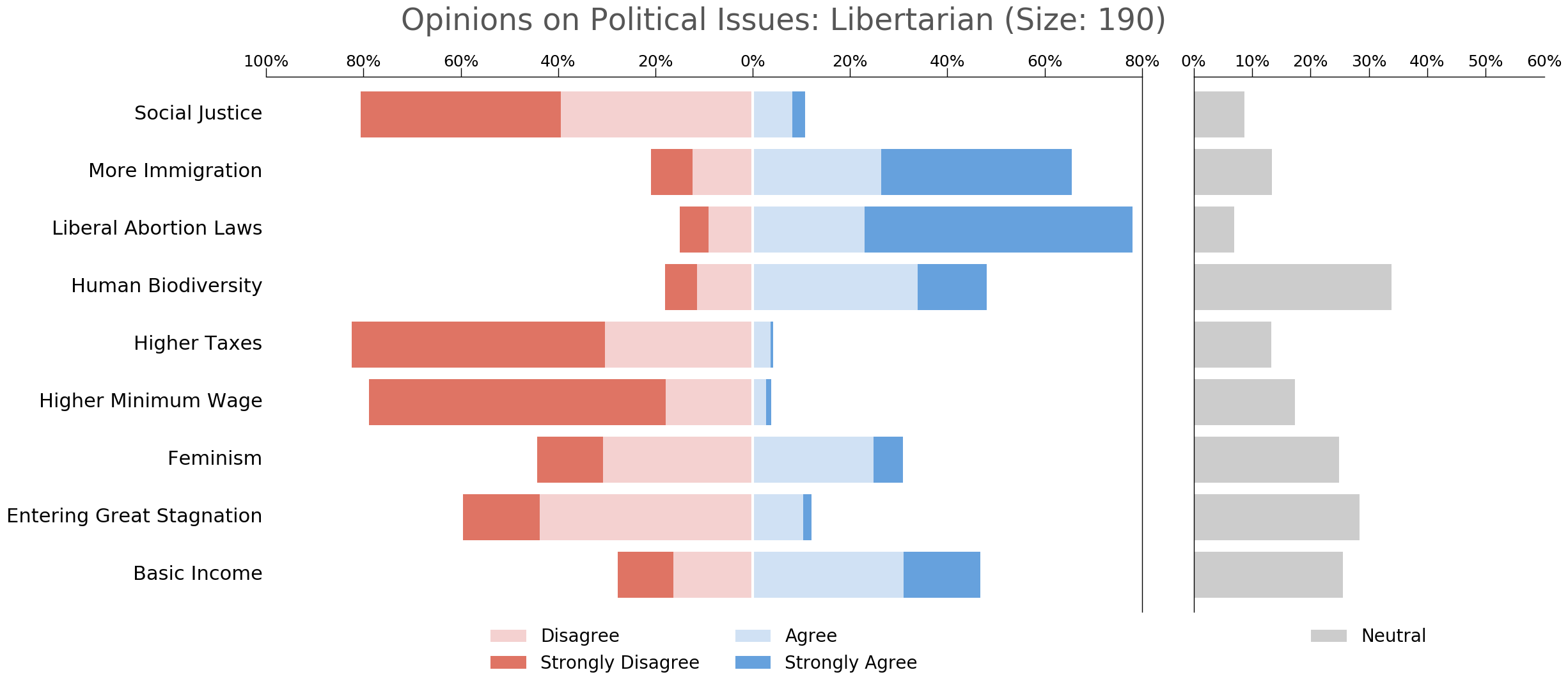
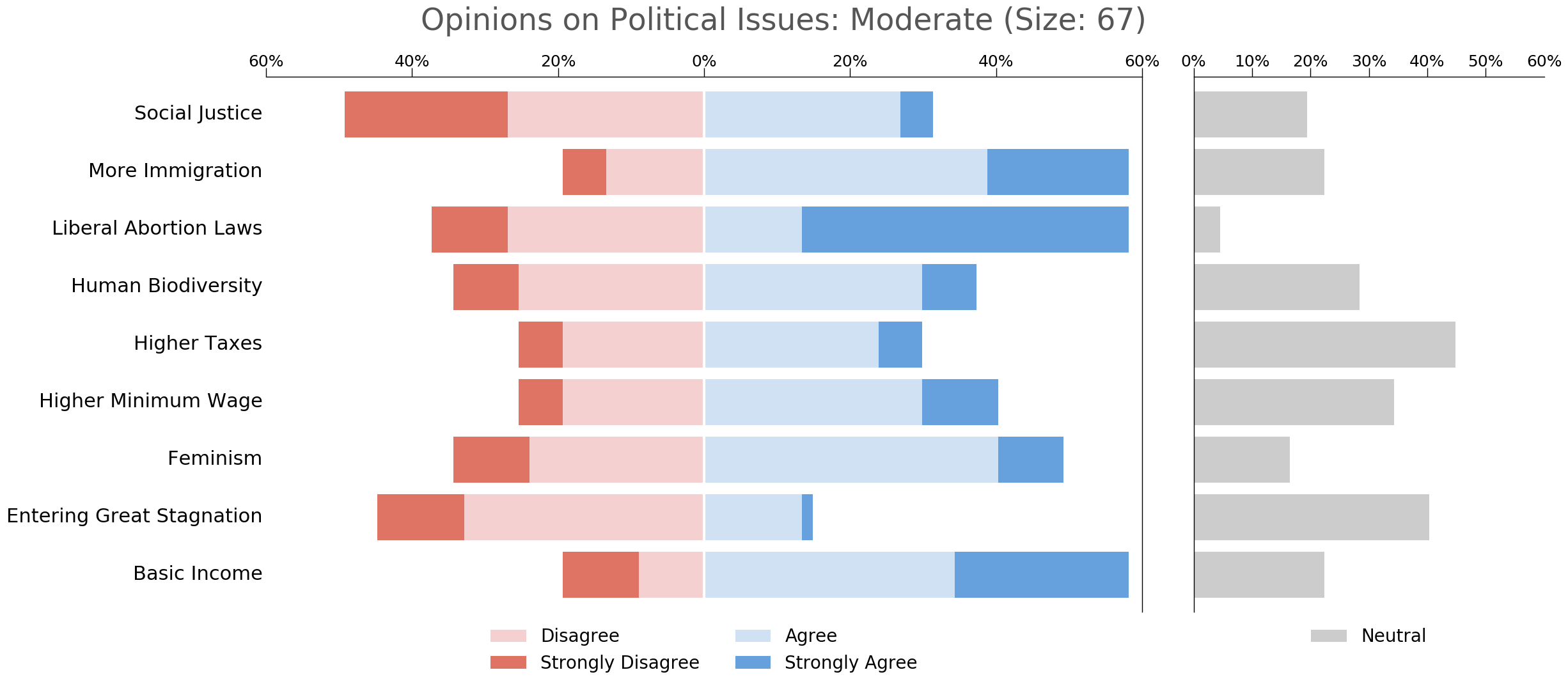
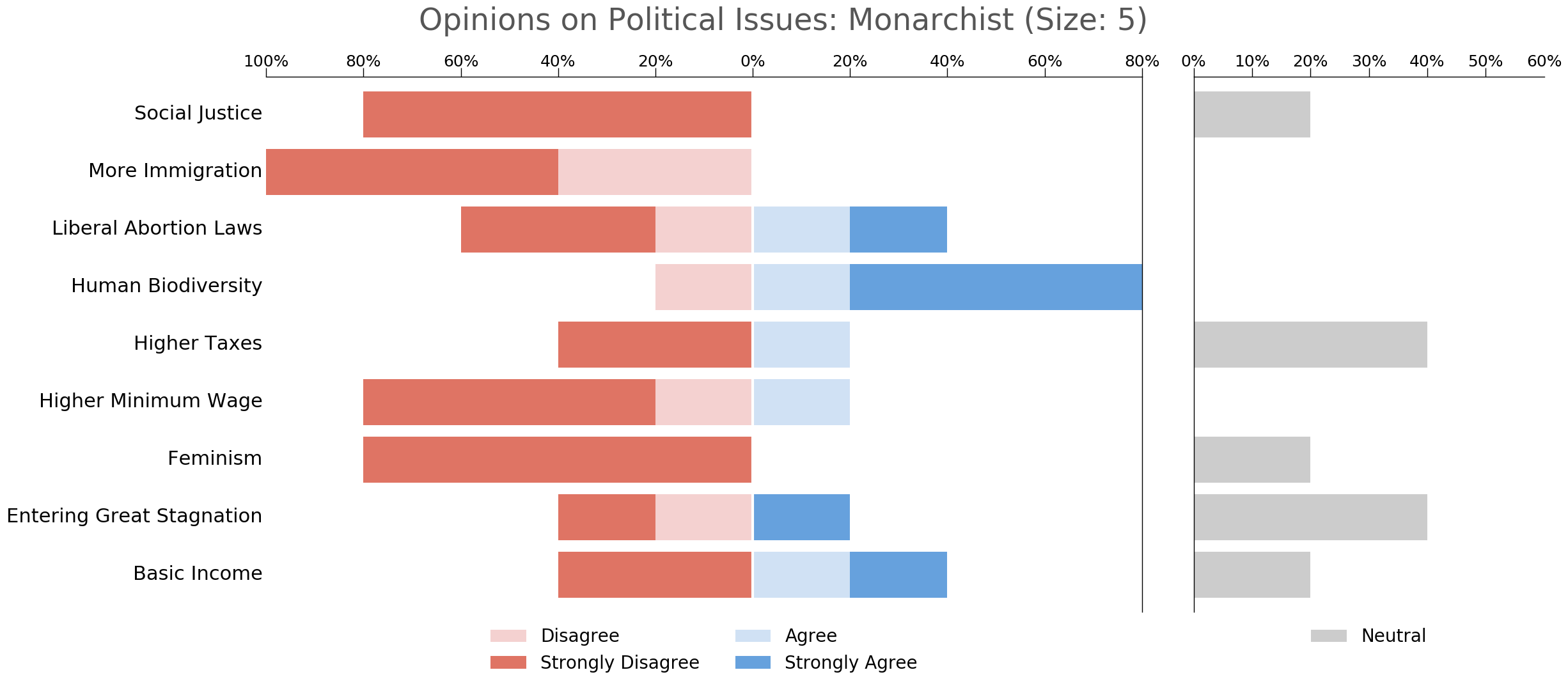
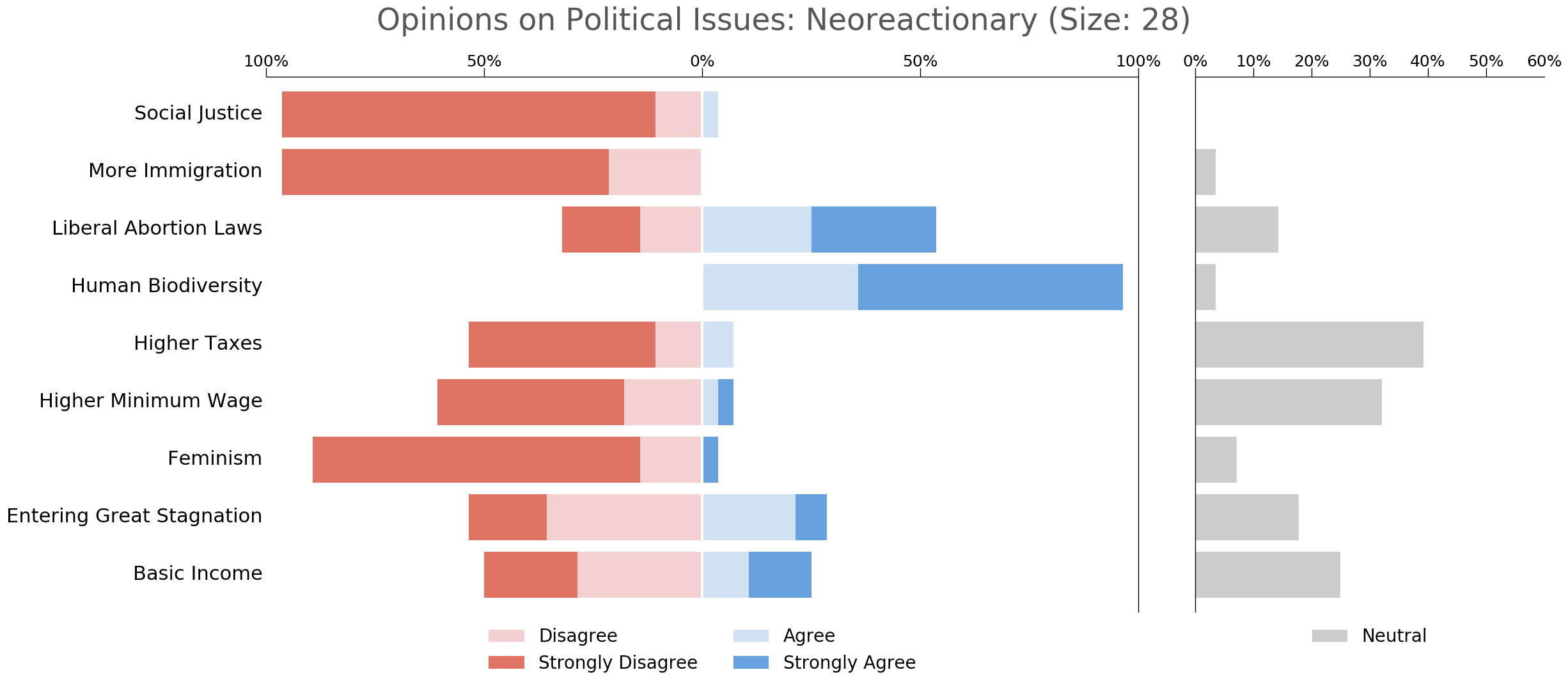
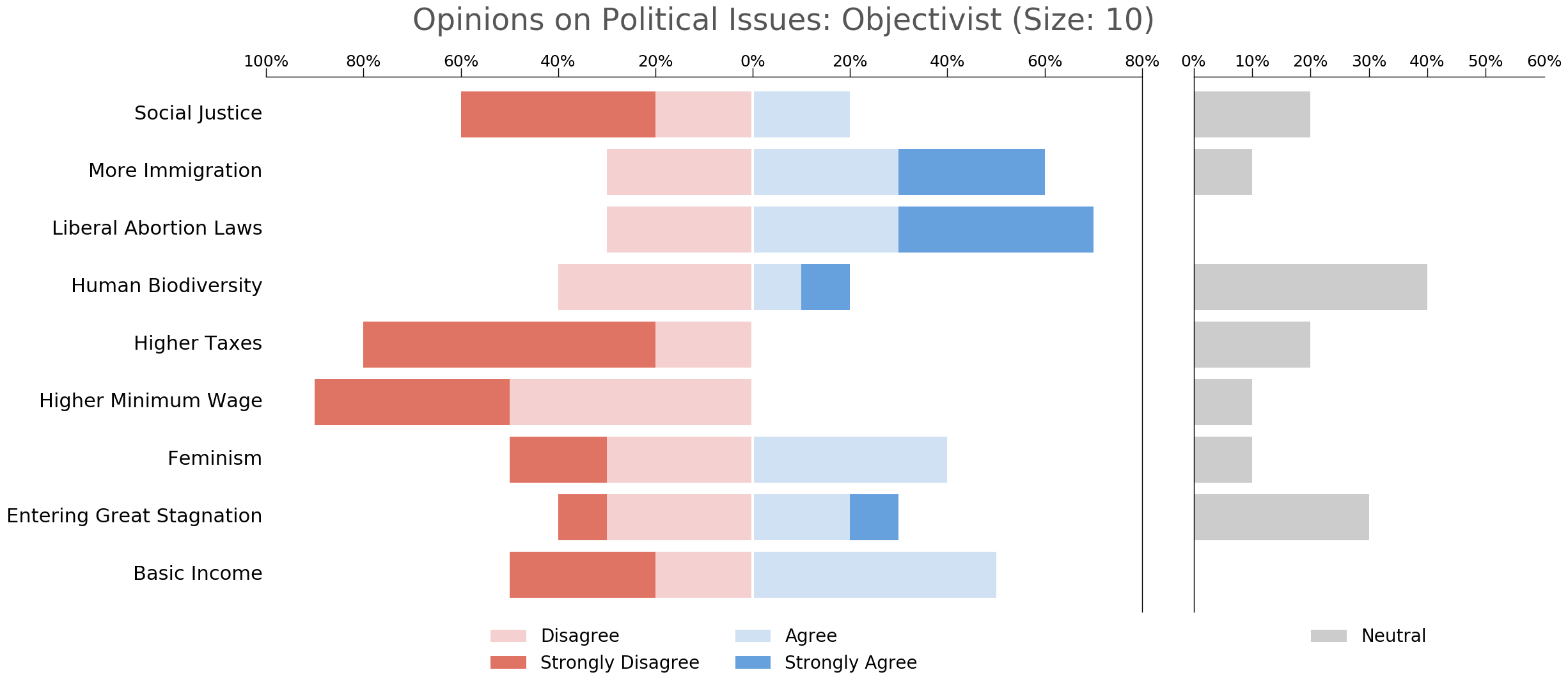
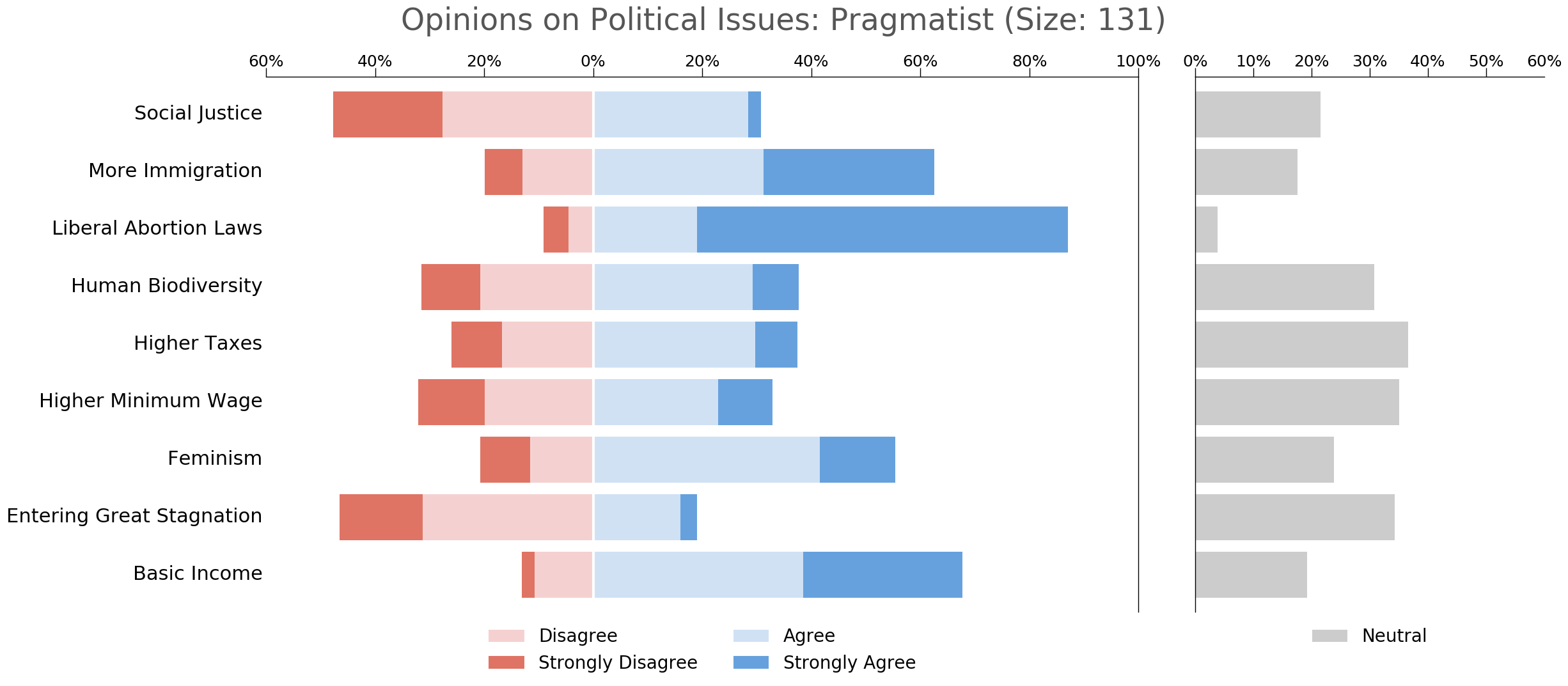
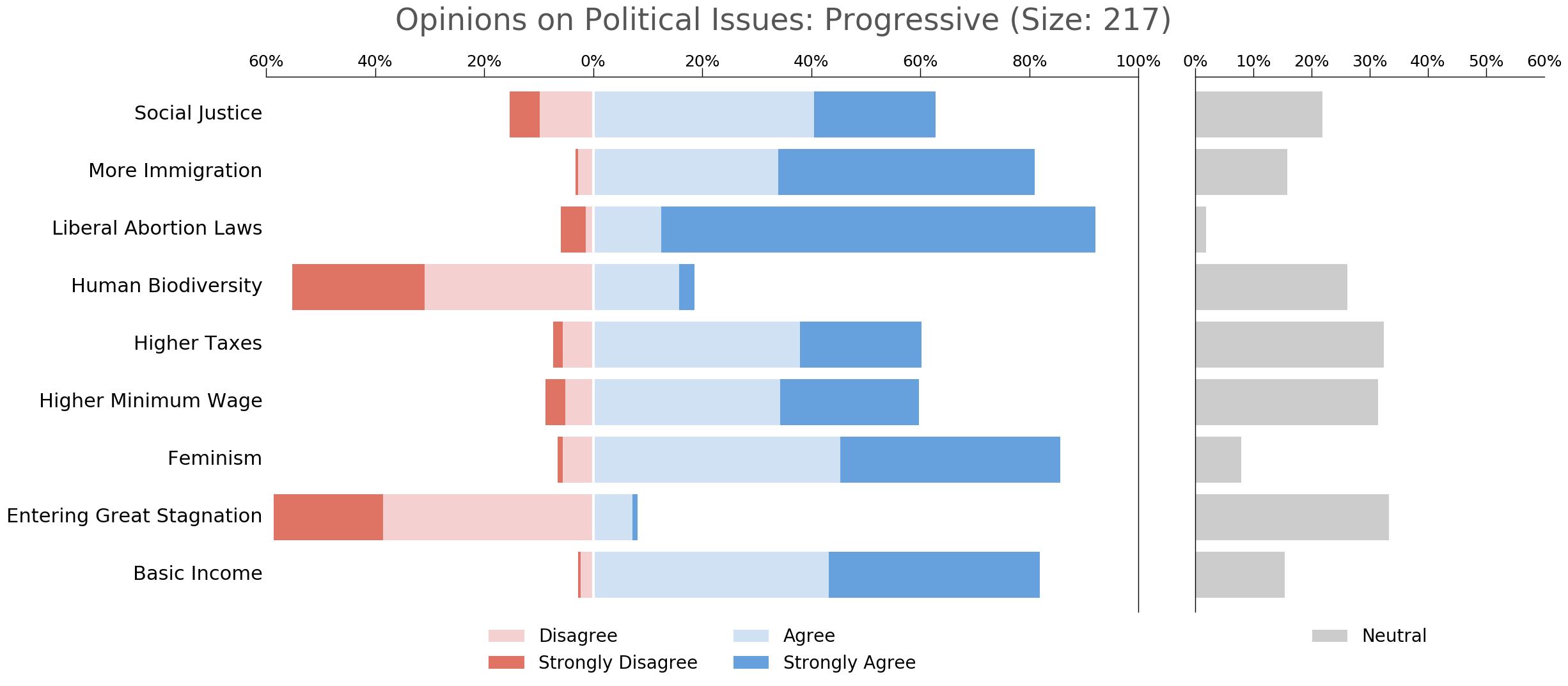
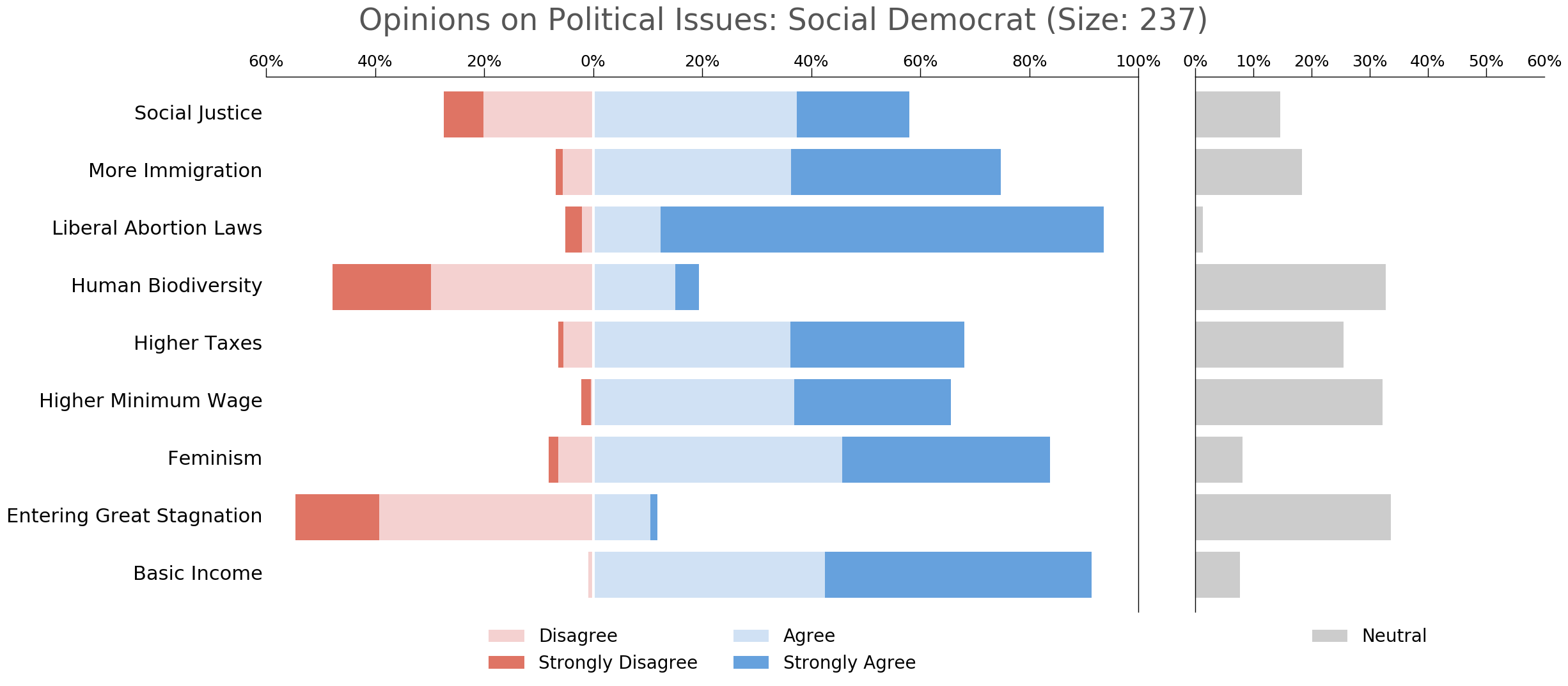
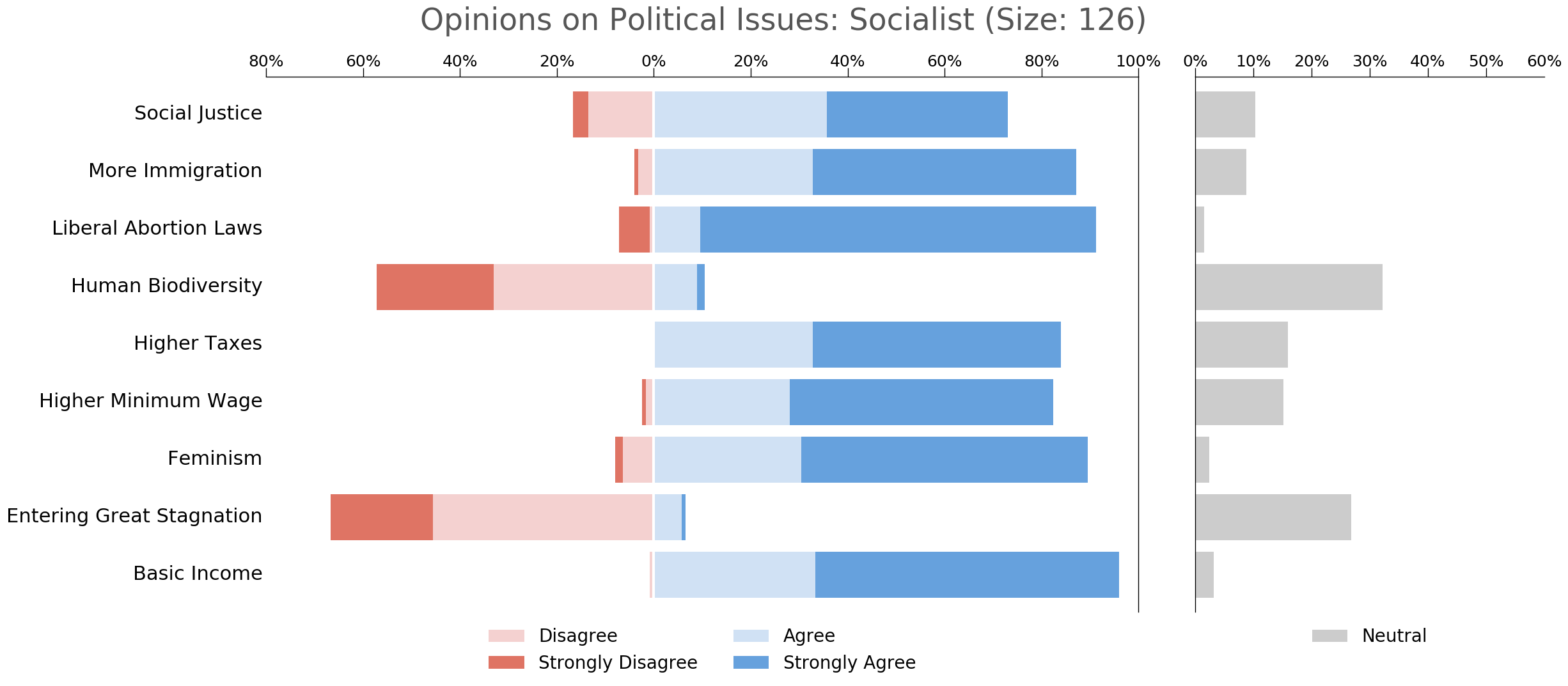
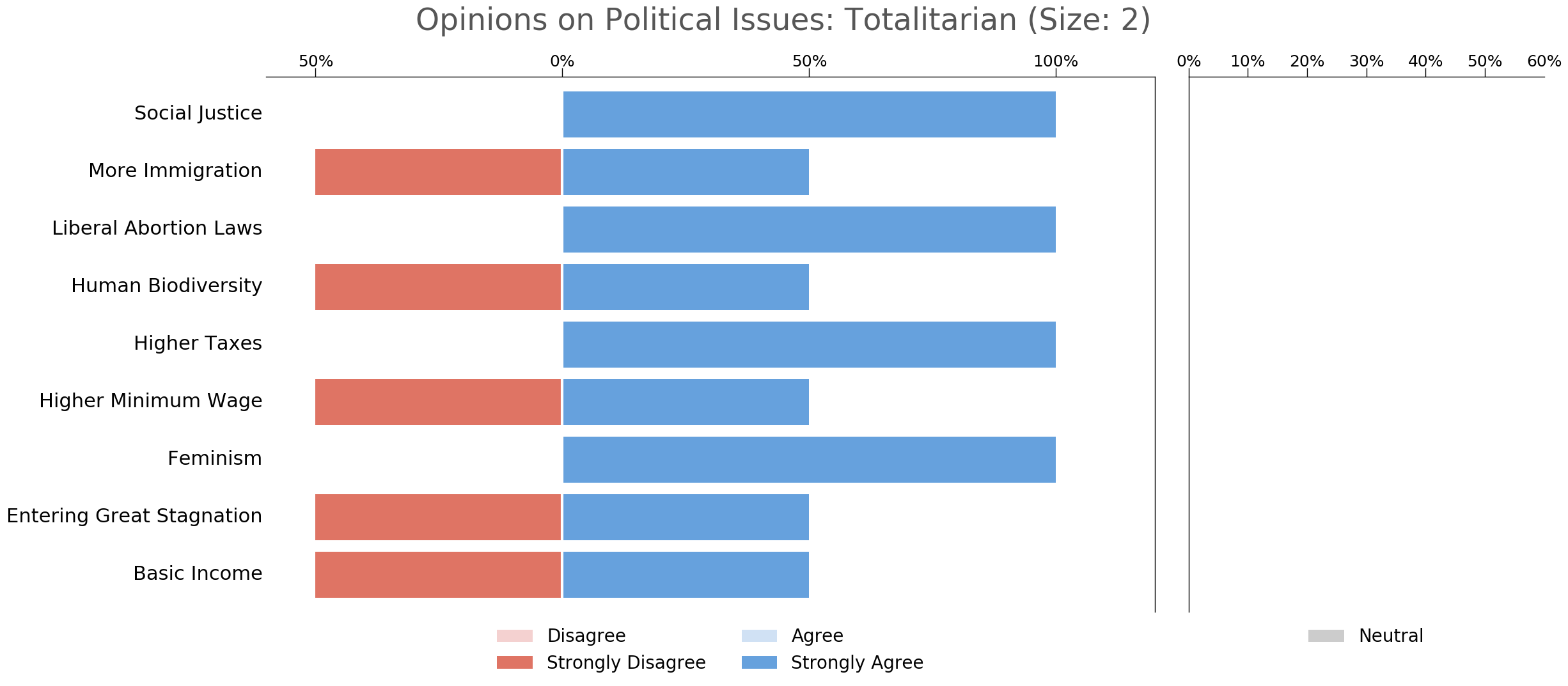
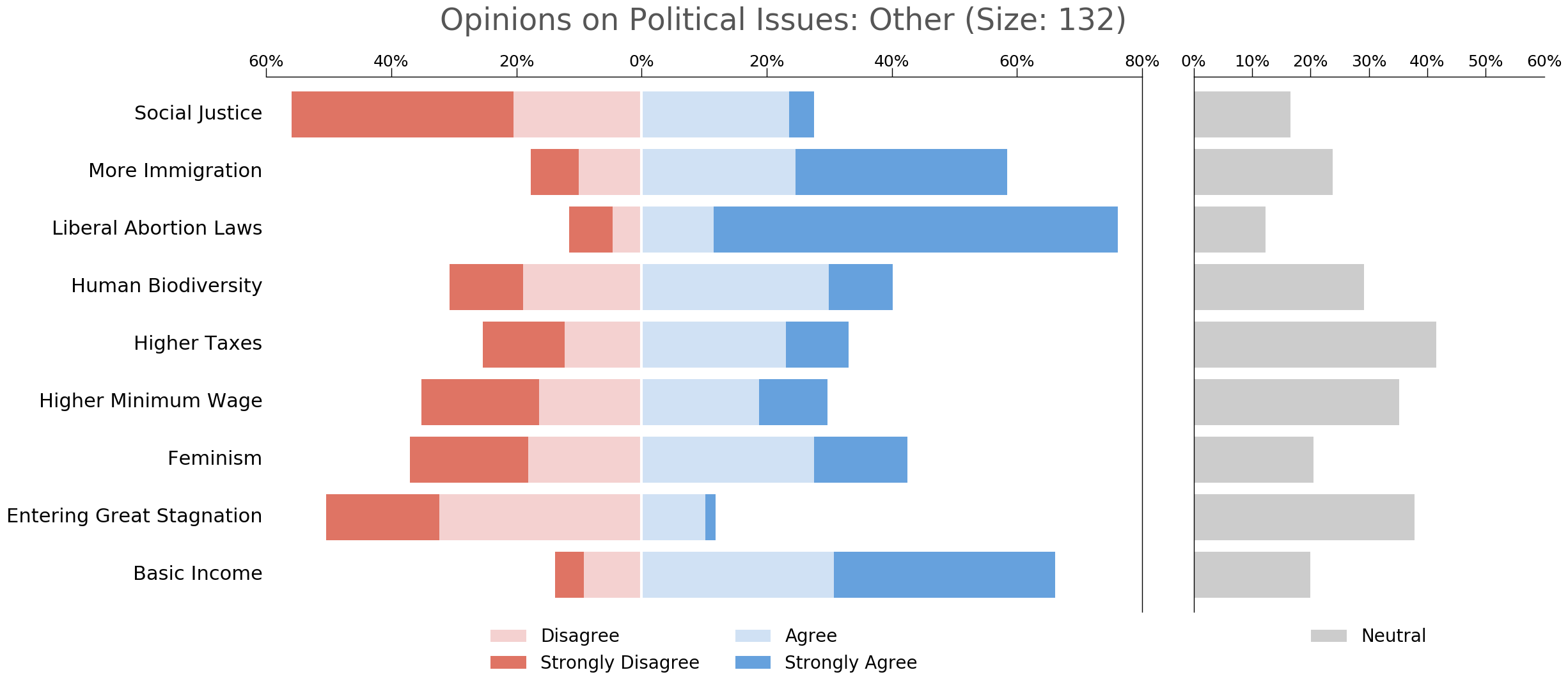
Miscellaneous Politics
There were also some other questions in this section which aren't covered by the above charts.
Voting
| Group | Turnout |
|---|---|
| LessWrong | 68.9% |
| Austrailia | 91% |
| Brazil | 78.90% |
| Britain | 66.4% |
| Canada | 68.3% |
| Finland | 70.1% |
| France | 79.48% |
| Germany | 71.5% |
| India | 66.3% |
| Israel | 72% |
| New Zealand | 77.90% |
| Russia | 65.25% |
| United States | 54.9% |
Calibration And Probability Questions
Calibration Questions
I just couldn't analyze these, sorry guys. I put many hours into trying to get them into a decent format I could even read and that sucked up an incredible amount of time. It's why this part of the survey took so long to get out. Thankfully another LessWrong user, Houshalter, has kindly done their own analysis.
All my calibration questions were meant to satisfy a few essential properties:
- They should be 'self contained'. I.E, something you can reasonably answer or at least try to answer with a 5th grade science education and normal life experience.
- They should, at least to a certain extent, be Fermi Estimable.
- They should progressively scale in difficulty so you can see whether somebody understands basic probability or not. (eg. In an 'or' question do they put a probability of less than 50% of being right?)
At least one person requested a workbook, so I might write more in the future. I'll obviously write more for the survey.
Probability Questions
| Question | Mean | Median | Mode | Stdev |
| Please give the obvious answer to this question, so I can automatically throw away all surveys that don't follow the rules: What is the probability of a fair coin coming up heads? | 49.821 | 50.0 | 50.0 | 3.033 |
| What is the probability that the Many Worlds interpretation of quantum mechanics is more or less correct? | 44.599 | 50.0 | 50.0 | 29.193 |
| What is the probability that non-human, non-Earthly intelligent life exists in the observable universe? | 75.727 | 90.0 | 99.0 | 31.893 |
| ...in the Milky Way galaxy? | 45.966 | 50.0 | 10.0 | 38.395 |
| What is the probability that supernatural events (including God, ghosts, magic, etc) have occurred since the beginning of the universe? | 13.575 | 1.0 | 1.0 | 27.576 |
| What is the probability that there is a god, defined as a supernatural intelligent entity who created the universe? | 15.474 | 1.0 | 1.0 | 27.891 |
| What is the probability that any of humankind's revealed religions is more or less correct? | 10.624 | 0.5 | 1.0 | 26.257 |
| What is the probability that an average person cryonically frozen today will be successfully restored to life at some future time, conditional on no global catastrophe destroying civilization before then? | 21.225 | 10.0 | 5.0 | 26.782 |
| What is the probability that at least one person living at this moment will reach an age of one thousand years, conditional on no global catastrophe destroying civilization in that time? | 25.263 | 10.0 | 1.0 | 30.510 |
| What is the probability that our universe is a simulation? | 25.256 | 10.0 | 50.0 | 28.404 |
| What is the probability that significant global warming is occurring or will soon occur, and is primarily caused by human actions? | 83.307 | 90.0 | 90.0 | 23.167 |
| What is the probability that the human race will make it to 2100 without any catastrophe that wipes out more than 90% of humanity? | 76.310 | 80.0 | 80.0 | 22.933 |
Probability questions is probably the area of the survey I put the least effort into. My plan for next year is to overhaul these sections entirely and try including some Tetlock-esque forecasting questions, a link to some advice on how to make good predictions, etc.
Futurology
This section got a bit of a facelift this year. Including new cryonics questions, genetic engineering, and technological unemployment in addition to the previous years.
Cryonics
Interestingly enough, of those who think it will work with enough confidence to say 'yes', only 14 are actually signed up for cryonics.
sqlite> select count(*) from data where CryonicsNow="Yes" and Cryonics="Yes - signed up or just finishing up paperwork";
14
sqlite> select count(*) from data where CryonicsNow="Yes" and (Cryonics="Yes - signed up or just finishing up paperwork" OR Cryonics="No - would like to sign up but unavailable in my area" OR "No - would like to sign up but haven't gotten around to it" OR "No - would like to sign up but can't afford it");
34
LessWrongers seem to be very bullish on the underlying physics of cryonics even if they're not as enthusiastic about current methods in use.
The Brain Preservation Foundation also did an analysis of cryonics responses to the LessWrong Survey.
Singularity
SingularityYear
By what year do you think the Singularity will occur? Answer such that you think, conditional on the Singularity occurring, there is an even chance of the Singularity falling before or after this year. If you think a singularity is so unlikely you don't even want to condition on it, leave this question blank.
Mean: 8.110300081581755e+16
Median: 2080.0
Mode: 2100.0
Stdev: 2.847858859055733e+18
I didn't bother to filter out the silly answers for this.Obviously it's a bit hard to see without filtering out the uber-large answers, but the median doesn't seem to have changed much from the 2014 survey.
Genetic Engineering
Well that's fairly overwhelming.
I find it amusing how the strict "No" group shrinks considerably after this question.
This question is too important to just not have an answer to so I'll do it manually. Unfortunately I can't easily remove the 'excluded' entries so that we're dealing with the exact same distribution but only 13 or so responses are filtered out anyway.
sqlite> select count(*) from data where GeneticImprovement="Yes";
1100
>>> 1100 + 176 + 262 + 84
1622
>>> 1100 / 1622
0.6781750924784217
67.8% are willing to genetically engineer their children for improvements.
These numbers go about how you would expect, with people being progressively less interested the more 'shallow' a genetic change is seen as.
All three of these seem largely consistent with peoples personal preferences about modification. Were I inclined I could do a deeper analysis that actually takes survey respondents row by row and looks at correlation between preference for ones own children and preference for others.
Technological Unemployment
LudditeFallacy
Do you think the Luddite's Fallacy is an actual fallacy?
Yes: 443 (30.936%)
No: 989 (69.064%)
We can use this as an overall measure of worry about technological unemployment, which would seem to be high among the LW demographic.
UnemploymentYear
By what year do you think the majority of people in your country will have trouble finding employment for automation related reasons? If you think this is something that will never happen leave this question blank.
Mean: 2102.9713740458014
Median: 2050.0
Mode: 2050.0
Stdev: 1180.2342850727339
Question is flawed because you can't distinguish answers of "never happen" from people who just didn't see it.Interesting question that would be fun to take a look at in comparison to the estimates for the singularity.
EndOfWork
Do you think the "end of work" would be a good thing?
Yes: 1238 (81.287%)
No: 285 (18.713%)
Fairly overwhelming consensus, but with a significant minority of people who have a dissenting opinion.
EndOfWorkConcerns
If machines end all or almost all employment, what are your biggest worries? Pick two.
| Question | Count | Percent |
| People will just idle about in destructive ways | 513 | 16.71% |
| People need work to be fulfilled and if we eliminate work we'll all feel deep existential angst | 543 | 17.687% |
| The rich are going to take all the resources for themselves and leave the rest of us to starve or live in poverty | 1066 | 34.723% |
| The machines won't need us, and we'll starve to death or be otherwise liquidated | 416 | 13.55% |
The plurality of worries are about elites who refuse to share their wealth.
Existential Risk
XRiskType
Which disaster do you think is most likely to wipe out greater than 90% of humanity before the year 2100?
Nuclear war: +4.800% 326 (20.6%)
Asteroid strike: -0.200% 64 (4.1%)
Unfriendly AI: +1.000% 271 (17.2%)
Nanotech / grey goo: -2.000% 18 (1.1%)
Pandemic (natural): +0.100% 120 (7.6%)
Pandemic (bioengineered): +1.900% 355 (22.5%)
Environmental collapse (including global warming): +1.500% 252 (16.0%)
Economic / political collapse: -1.400% 136 (8.6%)
Other: 35 (2.217%)
Significantly more people worried about Nuclear War than last year. Effect of new respondents, or geopolitical situation? Who knows.
Charity And Effective Altruism
Charitable Giving
Income
What is your approximate annual income in US dollars (non-Americans: convert at www.xe.com)? Obviously you don't need to answer this question if you don't want to. Please don't include commas or dollar signs.
Sum: 66054140.47384
Mean: 64569.052271593355
Median: 40000.0
Mode: 30000.0
Stdev: 107297.53606321265
IncomeCharityPortion
How much money, in number of dollars, have you donated to charity over the past year? (non-Americans: convert to dollars at http://www.xe.com/ ). Please don't include commas or dollar signs in your answer. For example, 4000
Sum: 2389900.6530000004
Mean: 2914.5129914634144
Median: 353.0
Mode: 100.0
Stdev: 9471.962766896671
XriskCharity
How much money have you donated to charities aiming to reduce existential risk (other than MIRI/CFAR) in the past year?
Sum: 169300.89
Mean: 1991.7751764705883
Median: 200.0
Mode: 100.0
Stdev: 9219.941506342007
CharityDonations
How much have you donated in US dollars to the following charities in the past year? (Non-americans: convert to dollars at http://www.xe.com/) Please don't include commas or dollar signs in your answer. Options starting with "any" aren't the name of a charity but a category of charity.
| Question | Sum | Mean | Median | Mode | Stdev |
| Against Malaria Foundation | 483935.027 | 1905.256 | 300.0 | None | 7216.020 |
| Schistosomiasis Control Initiative | 47908.0 | 840.491 | 200.0 | 1000.0 | 1618.785 |
| Deworm the World Initiative | 28820.0 | 565.098 | 150.0 | 500.0 | 1432.712 |
| GiveDirectly | 154410.177 | 1429.723 | 450.0 | 50.0 | 3472.082 |
| Any kind of animal rights charity | 83130.47 | 1093.821 | 154.235 | 500.0 | 2313.493 |
| Any kind of bug rights charity | 1083.0 | 270.75 | 157.5 | None | 353.396 |
| Machine Intelligence Research Institute | 141792.5 | 1417.925 | 100.0 | 100.0 | 5370.485 |
| Any charity combating nuclear existential risk | 491.0 | 81.833 | 75.0 | 100.0 | 68.060 |
| Any charity combating global warming | 13012.0 | 245.509 | 100.0 | 10.0 | 365.542 |
| Center For Applied Rationality | 127101.0 | 3177.525 | 150.0 | 100.0 | 12969.096 |
| Strategies for Engineered Negligible Senescence Research Foundation | 9429.0 | 554.647 | 100.0 | 20.0 | 1156.431 |
| Wikipedia | 12765.5 | 53.189 | 20.0 | 10.0 | 126.444 |
| Internet Archive | 2975.04 | 80.406 | 30.0 | 50.0 | 173.791 |
| Any campaign for political office | 38443.99 | 366.133 | 50.0 | 50.0 | 1374.305 |
| Other | 564890.46 | 1661.442 | 200.0 | 100.0 | 4670.805 |
This table is interesting given the recent debates about how much money certain causes are 'taking up' in Effective Altruism.
Effective Altruism
Vegetarian
Do you follow any dietary restrictions related to animal products?
Yes, I am vegan: 54 (3.4%)
Yes, I am vegetarian: 158 (10.0%)
Yes, I restrict meat some other way (pescetarian, flexitarian, try to only eat ethically sourced meat): 375 (23.7%)
No: 996 (62.9%)
EAKnowledge
Do you know what Effective Altruism is?
Yes: 1562 (89.3%)
No but I've heard of it: 114 (6.5%)
No: 74 (4.2%)
EAIdentity
Do you self-identify as an Effective Altruist?
Yes: 665 (39.233%)
No: 1030 (60.767%)
The distribution given by the 2014 survey results does not sum to one, so it's difficult to determine if Effective Altruism's membership actually went up or not but if we take the numbers at face value it experienced an 11.13% increase in membership.
EACommunity
Do you participate in the Effective Altruism community?
Yes: 314 (18.427%)
No: 1390 (81.573%)
Same issue as last, taking the numbers at face value community participation went up by 5.727%
EADonations
Has Effective Altruism caused you to make donations you otherwise wouldn't?
Yes: 666 (39.269%)
No: 1030 (60.731%)
Wowza!
Effective Altruist Anxiety
EAAnxiety
Have you ever had any kind of moral anxiety over Effective Altruism?
Yes: 501 (29.6%)
Yes but only because I worry about everything: 184 (10.9%)
No: 1008 (59.5%)
There's an ongoing debate in Effective Altruism about what kind of rhetorical strategy is best for getting people on board and whether Effective Altruism is causing people significant moral anxiety.
It certainly appears to be. But is moral anxiety effective? Let's look:
Sample Size: 244
Average amount of money donated by people anxious about EA who aren't EAs: 257.5409836065574
Sample Size: 679
Average amount of money donated by people who aren't anxious about EA who aren't EAs: 479.7501384388807
Sample Size: 249 Average amount of money donated by EAs anxious about EA: 1841.5292369477913
Sample Size: 314
Average amount of money donated by EAs not anxious about EA: 1837.8248407643312
It seems fairly conclusive that anxiety is not a good way to get people to donate more than they already are, but is it a good way to get people to become Effective Altruists?
Sample Size: 1685
P(Effective Altruist): 0.3940652818991098
P(EA Anxiety): 0.29554896142433235
P(Effective Altruist | EA Anxiety): 0.5
Maybe. There is of course an argument to be made that sufficient good done by causing people anxiety outweighs feeding into peoples scrupulosity, but it can be discussed after I get through explaining it on the phone to wealthy PR-conscious donors and telling the local all-kill shelter where I want my shipment of dead kittens.
EAOpinion
What's your overall opinion of Effective Altruism?
Positive: 809 (47.6%)
Mostly Positive: 535 (31.5%)
No strong opinion: 258 (15.2%)
Mostly Negative: 75 (4.4%)
Negative: 24 (1.4%)
EA appears to be doing a pretty good job of getting people to like them.
Interesting Tables
| Affiliation | Income | Charity Contributions | % Income Donated To Charity | Total Survey Charity % | Sample Size |
|---|---|---|---|---|---|
| Anarchist | 1677900.0 | 72386.0 | 4.314% | 3.004% | 50 |
| Communist | 298700.0 | 19190.0 | 6.425% | 0.796% | 13 |
| Conservative | 1963000.04 | 62945.04 | 3.207% | 2.612% | 38 |
| Futarchist | 1497494.1099999999 | 166254.0 | 11.102% | 6.899% | 31 |
| Left-Libertarian | 9681635.613839999 | 416084.0 | 4.298% | 17.266% | 245 |
| Libertarian | 11698523.0 | 214101.0 | 1.83% | 8.885% | 190 |
| Moderate | 3225475.0 | 90518.0 | 2.806% | 3.756% | 67 |
| Neoreactionary | 1383976.0 | 30890.0 | 2.232% | 1.282% | 28 |
| Objectivist | 399000.0 | 1310.0 | 0.328% | 0.054% | 10 |
| Other | 3150618.0 | 85272.0 | 2.707% | 3.539% | 132 |
| Pragmatist | 5087007.609999999 | 266836.0 | 5.245% | 11.073% | 131 |
| Progressive | 8455500.440000001 | 368742.78 | 4.361% | 15.302% | 217 |
| Social Democrat | 8000266.54 | 218052.5 | 2.726% | 9.049% | 237 |
| Socialist | 2621693.66 | 78484.0 | 2.994% | 3.257% | 126 |
| Community | Count | % In Community | Sample Size |
|---|---|---|---|
| LessWrong | 136 | 38.418% | 354 |
| LessWrong Meetups | 109 | 50.463% | 216 |
| LessWrong Facebook Group | 83 | 48.256% | 172 |
| LessWrong Slack | 22 | 39.286% | 56 |
| SlateStarCodex | 343 | 40.98% | 837 |
| Rationalist Tumblr | 175 | 49.716% | 352 |
| Rationalist Facebook | 89 | 58.94% | 151 |
| Rationalist Twitter | 24 | 40.0% | 60 |
| Effective Altruism Hub | 86 | 86.869% | 99 |
| Good Judgement(TM) Open | 23 | 74.194% | 31 |
| PredictionBook | 31 | 51.667% | 60 |
| Hacker News | 91 | 35.968% | 253 |
| #lesswrong on freenode | 19 | 24.675% | 77 |
| #slatestarcodex on freenode | 9 | 24.324% | 37 |
| #chapelperilous on freenode | 2 | 18.182% | 11 |
| /r/rational | 117 | 42.545% | 275 |
| /r/HPMOR | 110 | 47.414% | 232 |
| /r/SlateStarCodex | 93 | 37.959% | 245 |
| One or more private 'rationalist' groups | 91 | 47.15% | 193 |
| Affiliation | EA Income | EA Charity | Sample Size |
|---|---|---|---|
| Anarchist | 761000.0 | 57500.0 | 18 |
| Futarchist | 559850.0 | 114830.0 | 15 |
| Left-Libertarian | 5332856.0 | 361975.0 | 112 |
| Libertarian | 2725390.0 | 114732.0 | 53 |
| Moderate | 583247.0 | 56495.0 | 22 |
| Other | 1428978.0 | 69950.0 | 49 |
| Pragmatist | 1442211.0 | 43780.0 | 43 |
| Progressive | 4004097.0 | 304337.78 | 107 |
| Social Democrat | 3423487.45 | 149199.0 | 93 |
| Socialist | 678360.0 | 34751.0 | 41 |
25 comments
Comments sorted by top scores.
comment by gjm · 2016-09-12T12:48:35.955Z · LW(p) · GW(p)
It looks like the analysis didn't suppress responses that gave something other than 50 as an answer to the question about a coin flip. It probably should.
Replies from: ingres↑ comment by namespace (ingres) · 2016-09-13T01:48:59.815Z · LW(p) · GW(p)
Oh, yes, sorry.
comment by Luke_A_Somers · 2016-09-11T17:44:42.729Z · LW(p) · GW(p)
Is there a thread for the calibration question analysis? I have some questions and comments about that, more than this.
Replies from: Houshalter↑ comment by Houshalter · 2016-09-11T18:05:16.511Z · LW(p) · GW(p)
I'm going to post it to it's own thread when it's totally complete (the analysis itself is done but I just don't like the way the sections are organized.) You can ask me any questions you have. I'd be very interested in any suggestions to make it better or less confusing.
Replies from: Luke_A_Somers↑ comment by Luke_A_Somers · 2016-09-11T19:27:17.112Z · LW(p) · GW(p)
First, on the Hamilton question, it's not at all clear that the official answer is the correct one given the question. A very reasonable reading of the question would restrict the scope to items currently in circulation. Looking at the question, even knowing you meant 'ever', it feels like an unnatural way of asking. If you clarified, then I at least would have answered higher and with less confidence; and I suspect that almost everyone else would have as well.
Second, there are several questions which had a numeric range - like, say, the Dairy Queen question. Reducing to binary right-wrong seems needlessly lossy. If you convert the confidence of being within 10 years into an expected error on a Gaussian distribution, you can plot the actual deviations vs the expected deviations.
Third, I am trying to figure out if one can do something with the automatic probabilities-to-odds generation scheme discussed... somewhere here. I can't find it. Basically, you'd pair up people who were right on the same questions and see who would win, betting against each other based on their probabilities in such a way that they each expect to win the same amount. Only works between people who shared answers, though. Should be generalizable to people with similar levels of accuracy, and may be generalizable to people with different levels of accuracy.
Replies from: Houshalter↑ comment by Houshalter · 2016-09-12T01:31:58.479Z · LW(p) · GW(p)
I didn't design the questions and those are the official answers. And it does seems correct to me, that it should include all bills ever printed and not just those currently being printed.
I'm really not sure how to do your second point. I could fit all the answers into a normal distribution sure, but what information does that give me for any specific individual? It doesn't really tell me what their true probability of getting the question correct was, which I can already get from the percent of people that answered each question correctly.
The third idea is interesting, comparing people who got the same number of answers right. But it still does reward luck and prior knowledge. As I showed, people have indistinguishable probabilities of getting each question right, all that differs is how overconfident or underconfident they are.That model seems to produce the best correlations as well.
Replies from: Sniffnoy, Luke_A_Somers↑ comment by Sniffnoy · 2016-09-15T23:11:36.577Z · LW(p) · GW(p)
Agree with Luke about the Hamilton questions. I read it about current ones. If it meant "has appeared on", it should say "has appeared on", not "appears on". While certainly the latter can be read as all the ones he's ever appeared on, the more natural interpretation to me means those currently being printed.
You can probably get some idea to what extent it was interpreted this way by looking at the size of the answers. I'd say, if we assume people have some idea how American currency works, then 0-1 probably indicates a "present" interpretation, 3 or more will almost always indicate an "ever" interpretation, and 2 is hard to tell from. But that is assuming people have some idea of how American currency works.
↑ comment by Luke_A_Somers · 2016-09-13T16:25:20.076Z · LW(p) · GW(p)
1) Really?
Alexander Hamilton appears on how many distinct denominations of US Currency
It's the present tense that throws me. I would expect the question to be 'has appeared'. Whatever.
2) That's not what I meant. I mean, you can turn each individual person's prediction/probability pair into a gaussian curve. It is centered on their answer with width such that a 10 year window contains that much probability. You can then use that to get the probability this distribution - and thus, by proxy, the respondent - assigns to the actual year.
3) On such a small data set you can't get rid of luck, let alone differences in knowledge. I think that by picking out people who got the same number correct you do a pretty good job of de-confounding that. It cuts sideways across the bins in the 'mean % correct' vs 'mean % confidence' graph which showed flat performance across confidence, in a way that you can't do straightforwardly otherwise.
comment by skeptical_lurker · 2016-09-11T14:41:05.890Z · LW(p) · GW(p)
Have you considered adding the geometric mean for certain questions? It should help a bit to deal with extreamly large answers.
Some things I found interesting:
1) The case for being pro-choice is so strong even neoreactionaries and fascists are pro-choice. Interestingly, on this specific issue, conservatives are to the right of fascists!
2) On political opinions, HBD is about an objective, falsifiable, scientifically mesureable characteristic of the world, whereas the other opinions are opinions. Opinions on HBD also correlates strongly with other views, and so I am interested as to how poeple's opinions would change if it was proved to them that the truth about HBD is the opposite of what they currently believe it to be. Would their other views change?
3) Some of the '90% of humanity die' risks seem extremely low probability to me, and I am perplexed by why so many people chose them:
Nuclear war: +4.800% 326 (20.6%)
The worst case scenario for nuclear war at the hight of the cold war was about 40% of humanity dies. I suppose that its possible that vast numbers of new bombs could be built, without similar investment in bomb shelters, but this does seem a little implausible.
Environmental collapse (including global warming): +1.500% 252 (16.0%)
In the 'Cretaceous hothouse' period CO2 levels were 8x higher, and there was still enough vegetation to support giant dinosaurs far bigger than the largest animal today. The worst-case scenarios are a decrease in economic growth and a migrant crisis, not 90% of humanity dies.
Economic / political collapse: -1.400% 136 (8.6%)
Its difficult enough to imagine political collapse killing 90% of the population in one country. The Syrian civil war has killed 3% of the population. The Japanese invasion of China killed 4%. I'm aware of some wars that killed 50% - parts of the thirty years war, the Mongol invasion of China - but I think these were combined with famines or disease outbreaks. In the 1870 Japanese civil war, the samurai combatants took over 99% casualties, but the non-combatants survived. 90% deaths of one country would be mind-boggling. But 90% deaths of the whole of humanity? A political collapse that affects the entire world, including countries of every culture? Including China and other countries that are not democracies?
Replies from: Houshalter, Good_Burning_Plastic, selylindi↑ comment by Houshalter · 2016-09-12T03:49:39.843Z · LW(p) · GW(p)
The case for being pro-choice is so strong even neoreactionaries and fascists are pro-choice. Interestingly, on this specific issue, conservatives are to the right of fascists!
Probably more a case of demographics than the ideology itself. Total speculation, but I imagine someone who identifies as fascist is in the "liberal" demographic but happens to be into weird political beliefs in general, while someone who identifies as conservative might have just inherited that view from their family and upbringing. In general, I think old "conservative social issues" are becoming less popular among the younger generation. As our culture changes and gays and abortion become normal, the objections to them will decrease.
On political opinions, HBD is about an objective, falsifiable, scientifically mesureable characteristic of the world, whereas the other opinions are opinions. Opinions on HBD also correlates strongly with other views, and so I am interested as to how poeple's opinions would change if it was proved to them that the truth about HBD is the opposite of what they currently believe it to be. Would their other views change?
I think HBD is a fantastic test for true rationality. It's a rare case where a scientific fact conflicts with deeply ingrained political and cultural values.
The worst case scenario for nuclear war at the hight of the cold war was about 40% of humanity dies. I suppose that its possible that vast numbers of new bombs could be built, without similar investment in bomb shelters, but this does seem a little implausible.
The people directly killed by bombs are only a tiny fraction of the casualties. Afterwards you have the possibility of nuclear winter, which could radically change the climate for the worse. You have contamination of vast amounts of farmland and food supplies, and the destruction of the global economy. Even countries that weren't hit directly would be have tons of issues and would probably collapse.
In the 'Cretaceous hothouse' period CO2 levels were 8x higher, and there was still enough vegetation to support giant dinosaurs far bigger than the largest animal today. The worst-case scenarios are a decrease in economic growth and a migrant crisis, not 90% of humanity dies.
Sudden changes to the climate are bad. In the past the climate changed very very slowly, so that life had a chance to adapt. CO2 is acidifying the oceans and could destroy most of the oceans ecosystems. I tend to agree that humanity would probably survive though.
Replies from: skeptical_lurker↑ comment by skeptical_lurker · 2016-09-12T15:45:45.495Z · LW(p) · GW(p)
I think HBD is a fantastic test for true rationality. It's a rare case where a scientific fact conflicts with deeply ingrained political and cultural values.
Unfortunately it might also be an area where epistemic and instrumental rationality clash. In fact, most of the world does not have freedom of speech in the same way the US does - if one advocated HBD in, say, Germany, could one be thrown in prison in the same way people are imprisoned for saying 'seig heil'? On reflection, that might be a bad example, because there is a good reason why laws prohibiting Nazism exist in specifically Germany, but laws against racial hatred exist in many other countries too, and I wonder if "I am just pointing out a scientific fact, it doesn't mean I hate anyone" would be a successful legal defence when the judge and jury are not rationalists.
The people directly killed by bombs are only a tiny fraction of the casualties. Afterwards you have the possibility of nuclear winter, which could radically change the climate for the worse. You have contamination of vast amounts of farmland and food supplies, and the destruction of the global economy. Even countries that weren't hit directly would be have tons of issues and would probably collapse.
The study I am thinking of did account for this. It is thought that nuclear winter would last 6 months (based on global cooling from very large volcanic eruptions, 3 km^3 of ash cools the planet by 0.5 degrees for 6 months) and in the worst-case scenario this happens at the right time of the year to make the harvests fail. Africa starves and takes high casualties even without being nuked, while Japan raids nearby countries for food. I'm not sure why they singled out Japan for stealing food, maybe they were still angry over WWII or had some other reason to believe that Japan would behave like that.
There have been quite a few airburst nuclear tests, and the background radiation on earth has barely changed. While the half life of uranium is millions or billions of years (depending upon isotope) the products of a nuclear explosion have very short half-lives - the worst would be over within an hour. Not only do we not have enough bombs to contaminate the world, but ground zero would be habitable again after a few months. Hiroshima was rebuilt, not abandoned, after WWII.
Yes, I agree many countries would collaspe, and moreover that the primary combatants quite possibly would take over 90% casualties, the low global rate being largely because many countries emerge unscathed. If there were some reason for most countries to be nuked, and enough bombs to nuke them all, then 90% global casualties is a possiblity, and while I think a nuclear war between allmost all countries is unlikly, its still a lot more likly then 90% of humanity killed by environmental or political collapse.
Sudden changes to the climate are bad. In the past the climate changed very very slowly, so that life had a chance to adapt.
Life is pretty good at surviving. Humans can live in the arctic circle and in tropical rainforest. Hopefully, by this time we would also have better technology to help us.
CO2 is acidifying the oceans and could destroy most of the oceans ecosystems.
This is a little worrying. I thought it was mostly 'just' the corral reefs, which, while very pretty, are not vital to everything.
Replies from: Houshalter, ChristianKl↑ comment by Houshalter · 2016-09-12T18:16:50.066Z · LW(p) · GW(p)
Unfortunately it might also be an area where epistemic and instrumental rationality clash. In fact, most of the world does not have freedom of speech in the same way the US does - if one advocated HBD in, say, Germany, could one be thrown in prison in the same way people are imprisoned for saying 'seig heil'?
There is a difference between advocating something and merely believing it. But I'm mostly skeptical of the people that put "strongly disagree" on that question. As opposed to "disagree" or "neutral". The fact that it's so correlated with political ideology is more evidence that it's just political bias.
If I lived 200 years ago, I wouldn't go around advocating atheism. But I might have believed it privately, and I would be more skeptical of the openmindedness of people that say they "strongly oppose the evils of atheism".
The study I am thinking of did account for this.
I really don't know. When I researched this it seems like the effects are pretty hard to estimate. Different models give very different results. A recentish study using more modern climate models shows that the effects would be catastrophic and last for multiple years:
https://en.wikipedia.org/wiki/Nuclear_winter#2007_study_on_global_nuclear_war
the products of a nuclear explosion have very short half-lives - the worst would be over within an hour. Not only do we not have enough bombs to contaminate the world, but ground zero would be habitable again after a few months.
Those first few months are the problem though. The crops and livestock die or absorb the radioactive isotopes. The people too if they don't happen to have a fallout shelter handy.
Also the nuclear bombs themselves aren't the only concern. You would have to deal with all the waste left in the cities they destroy. Nuclear power plants would melt down with no one to contain them. Vast amounts of chemical waste would leak from abandoned chemical plants and waste storage. Oil would leak and pollute the oceans with no cleanup.
I don't know how to estimate the damage of this. But it should be at least a bad or worse than major industrial accidents of the past, like Bhopal, deepwater horizon, or Chernobyl. But all happening at once and with no one left to organize any kind of response.
while I think a nuclear war between allmost all countries is unlikly, its still a lot more likly then 90% of humanity killed by environmental or political collapse.
I think you are underestimating the secondary effects. I imagine a complete destruction of the global economy. There isn't enough food to go around and lots of countries are starving. This would lead to more war and chaos.
A few thousand years ago the civilizations of the mediterranean all collapsed almost at once. It's now speculated to be the result of a serious drought and bad weather. The states that couldn't feed their population got overthrown, and their hungry populations went to war with neighboring countries for food, until nothing of the old orders remained. It was a serious setback for humanity.
If that happened in the modern world, technological civilization might end and never be restarted. The modern world depends on hugely complex infrastructure and tons of different industries and inputs. If we lose that, it would be very difficult to rebuild. We've already extracted most of the easy to get to minerals and fossil fuels. Much farmland has been degraded from overuse and depends on inputs of fertilizer, irrigation systems, and of course modern machinery which would be difficult to replace.
Replies from: skeptical_lurker↑ comment by skeptical_lurker · 2016-09-15T11:42:45.591Z · LW(p) · GW(p)
There is a difference between advocating something and merely believing it. But I'm mostly skeptical of the people that put "strongly disagree" on that question. As opposed to "disagree" or "neutral". The fact that it's so correlated with political ideology is more evidence that it's just political bias.
This correlation is what interests me - it does fit with political bias, but could it also be that the political views are a product of beliefs in HBD?
I really don't know. When I researched this it seems like the effects are pretty hard to estimate. Different models give very different results. A recentish study using more modern climate models shows that the effects would be catastrophic and last for multiple years:
I think I might have put too much faith in one study. Perhaps 90% deaths is plausible.
Those first few months are the problem though. The crops and livestock die or absorb the radioactive isotopes. The people too if they don't happen to have a fallout shelter handy.
The crops may absorb the isotopes, but the isotopes will continue to decay, and so by the time the crops are to be eaten they should be fairly safe. I agree that there would be terrible casualties, but I don't think it would be as bad as having to spend a decade underground.
Moreover, my main point here is that the cloud of radioactive death might kill 95% of the US/Russia (or whoever the primary belligerents are) but by the time it reaches Brazil for instance it would be a lot less radioactive.
If that happened in the modern world, technological civilization might end and never be restarted.
I agree. The end of technological civilization is a different point from simple mass casualties - if 'only' 40% of humanity dies, but those 40% are concentrated in first world countries and urban centres, would the survivors be able to rebuild? Machinery would continue to work for a while, although the oil distribution chain would break for a while at least, but in the long run machinery would break. The factories tend to be in the first world countries that have been nuked, the universities in the cities have been mostly destroyed. Moreover there would likely be a general luddite tendency to blame technology for the crisis. Its probably easier to restablish resource extraction then to restart scientific research, and so we would be less likely to develop renewable energy before the fossil fuels run out. I suppose the end of technological civiliseation would reduce the population back to medieval levels, although this would be a long process of resources slowly running out and machinery slowly degrading.
Replies from: pepe_prime↑ comment by pepe_prime · 2016-09-18T10:27:51.044Z · LW(p) · GW(p)
Houshalter
If that happened in the modern world, technological civilization might end and never be restarted. The modern world depends on hugely complex infrastructure and tons of different industries and inputs. If we lose that, it would be very difficult to rebuild. We've already extracted most of the easy to get to minerals and fossil fuels. Much farmland has been degraded from overuse and depends on inputs of fertilizer, irrigation systems, and of course modern machinery which would be difficult to replace.
skeptical_lurker
I agree. The end of technological civilization is a different point from simple mass casualties - if 'only' 40% of humanity dies, but those 40% are concentrated in first world countries and urban centres, would the survivors be able to rebuild? Machinery would continue to work for a while, although the oil distribution chain would break for a while at least, but in the long run machinery would break. The factories tend to be in the first world countries that have been nuked, the universities in the cities have been mostly destroyed. Moreover there would likely be a general luddite tendency to blame technology for the crisis. Its probably easier to restablish resource extraction then to restart scientific research, and so we would be less likely to develop renewable energy before the fossil fuels run out. I suppose the end of technological civiliseation would reduce the population back to medieval levels, although this would be a long process of resources slowly running out and machinery slowly degrading.
I've often heard claims like these and wonder what the exact date of regression would be. Suppose the low hanging fruit have been removed for a number of modern resources (oil, helium, fissionables, rare metals). We still have quite a lot of coal (in the US and Russia), wind, and hydro power for energy. We also have abundant common metals, which might be more accessible than before if civilization collapsed and left a bunch of scrap around. My understanding is that coal and modern smelting techniques with common metals get us to at least 1850. Furthermore, modern scientific knowledge can't be significantly lost because this requires destroying virtually all books or other records. Hence I would expect at least some of humanity to never slip further back than this point.
I'm sort of nitpicking though. I agree that 40% dead could easily lead to 90% dead.
Replies from: scarcegreengrass↑ comment by scarcegreengrass · 2016-09-20T20:49:06.905Z · LW(p) · GW(p)
The preceding comments are a good example of Less Wrong users taking a contentious disagreement and coming to a courteous equilibrium. Impressive.
Replies from: skeptical_lurker↑ comment by skeptical_lurker · 2016-09-22T23:07:26.445Z · LW(p) · GW(p)
Thanks!
↑ comment by ChristianKl · 2016-09-20T21:13:11.682Z · LW(p) · GW(p)
In fact, most of the world does not have freedom of speech in the same way the US does - if one advocated HBD in, say, Germany, could one be thrown in prison in the same way people are imprisoned for saying 'seig heil'?
There are things that you can't legally say in Germany but standard claims about how different races have different IQ are not among the claims that are illegal in Germany. Berlin former minister of finance wrote a HBD book making the case about how IQ is heritable and how that should inform policy making.
↑ comment by Good_Burning_Plastic · 2016-09-18T07:36:16.888Z · LW(p) · GW(p)
giant dinosaurs far bigger than the largest animal today
You mean largest land animal today. The blue whale is about the size of the largest dinosaur ever.
Replies from: skeptical_lurker↑ comment by skeptical_lurker · 2016-09-20T19:18:25.375Z · LW(p) · GW(p)
A valid nitpick, although sharks were also far bigger compared to modern sharks. Not sure to what extent this implies that there was more food.
↑ comment by selylindi · 2016-09-17T15:32:06.194Z · LW(p) · GW(p)
2) On political opinions, HBD is about an objective, falsifiable, scientifically mesureable characteristic of the world, whereas the other opinions are opinions.
That's not how I interpreted the item. This was a political quiz, so to my mind it's not about "Does X exist?", but "Do you favor more X than the status quo?" For example, liberal abortion laws exist, and feminism exists, and higher taxes exist. Similarly, HBD may exist depending on its precise definition. But what's politically relevant is whether you favor more liberal abortion laws, more feminism, more tax increases, more HBD. So it's quite likely that a substantial fraction of quiz-takers interpreted being "pro-HBD" as being simply an NRXish way of saying "pro-racist-policies".
Replies from: skeptical_lurker↑ comment by skeptical_lurker · 2016-09-20T19:22:08.305Z · LW(p) · GW(p)
liberal abortion laws exist
illiberal abortion laws exist too, in some countries. Maybe in future tests HBD should be split into "is HBD true?" and "do you want HBD to be true?" to avoid this sort of confusion.
But what's politically relevant is whether you favor more liberal abortion laws, more feminism, more tax increases, more HBD.
The government can raise taxes, it can't raise HBD.
comment by John_Maxwell (John_Maxwell_IV) · 2016-09-10T13:46:48.084Z · LW(p) · GW(p)
Thanks for the analysis!
The median amount donated to bugs rights charities is listed as $157.5. That implies that half of survey respondents donated >$150 to bugs rights charities. Obviously this is kind of implausible. I assume the real number who donated to bugs rights charities is 4 people, since the donations sum to $1083.0 and the average amount donated is $270.75. This also goes for the other donation-related questions--just something to keep in mind.
Replies from: ingres↑ comment by namespace (ingres) · 2016-09-10T23:08:55.145Z · LW(p) · GW(p)
Yes, this is one of those pieces of the relevant statistics that I did wrong. (Or at the very least, did inoptimally even if the actual series of operations taken is 'correct'.)
I'll fix it eventually, but it'll require a bit of rewriting code first.
↑ comment by skeptical_lurker · 2016-09-20T19:10:57.144Z · LW(p) · GW(p)
This is a good point, although I would partially agree with them - not only am I pro-choice, but I would strongly advice someone to abort if the child would have Down's syndrome for instance. It is the humane thing to do for all involved - you don't condemn a child to sickness and parents to possibly watching a child die before they do.
↑ comment by skeptical_lurker · 2016-09-21T11:26:51.998Z · LW(p) · GW(p)
Well, firstly I'm saying this should be voluntary, and most people are not going to try to commit genocide, especially against their own race. Secondly, do you realise that the number of kids people have already correlates strongly with race and religion? Although, the correlation is more that race correlates with religion and development which in turn causes fertility. I'm not claiming that race causes religion. Thirdly, aborting kids with horrible genetic deceases could actually raise the population after two generations, because the diseases would stop the kids from having kids of their own.
Generally, I don't find the argument "X is bad because it's affects correlates with race" to be plausible, because its so universal. It would stop you doing anything.